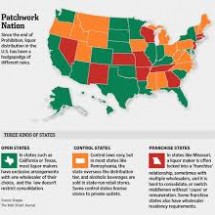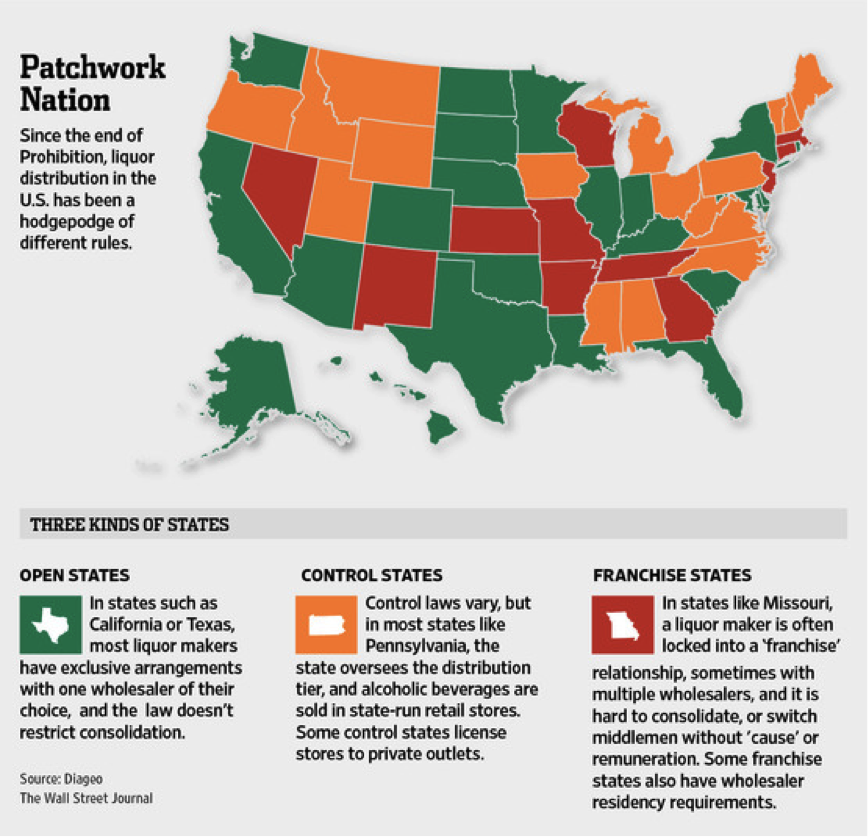Law Offices of John P. Connell, P.C.: On June 28, 2013, the Wall Street Journal reported on the brewing battle to dismantle the nation’s “franchise laws” that prevent manufacturers of alcoholic beverages from terminating their wholesalers.
As the Journal reports, Diageo, the world’s largest distiller and the owner of many household brands of spirits, is seeking to terminate its wholesaler, Major Brands, Inc. Yet despite Diageo’s insistence that Major Brands was failing to meet its goals and was driving up distribution costs, franchise laws have prevented Diageo from terminating the wholesaler relationship. Franchise laws require a manufacturer to maintain the “franchise” created between itself and its wholesaler in regard to the particular brand or brands the wholesaler was hired to distribute. Since these laws have locked Diageo to its wholesaler, Diageo’s efforts have been referred to as something of a “liquor war.”
There is a deep divide among states instituting franchise laws and those considered “non-franchise” states. In “non-franchise” states, a manufacturer can terminate a wholesaler at will, subject to provisions in any contract. Such states may merely require notification of termination to wholesalers within a specific number of days.
In “franchise states,” however, once a wholesaler relationship is established, whether by a signed contract, one-time delivery of products or a series of sales to a wholesaler, a manufacturer must have “good cause” to terminate a wholesaler or run the risk of paying damages to that terminated wholesaler. What constitutes “good cause,” however, is often a narrow set of circumstances. Additionally, in some states, a manufacturer is locked into its wholesaler relationship even more extensively by being obligated to continue doing business with a successor wholesaler, created by the merger or sale of the original wholesaler.
Missouri is the epicenter of Diageo’s efforts to defeat franchise laws. In a St. Louis lawsuit, Diageo was allowed to terminate its wholesaler, Major Brands. The court held that “[a]lthough distributors themselves are seldom, if ever, identifiable by the consuming public, as a matter of fact there often exists a very strong community of interest between liquor suppliers and their distributors” and that, in this case, Diageo had such a “community of interest” with Major Brands. Major Brands, Inc. v. Diageo North America, Inc., Docket No. 1322-CC00534 (Mo. Circ. Ct. June 20, 2013) (Dierker, J). For this reason, although Major Brands lost its quest for an injunction to prohibit its termination in this case, and although Diageo is poised to anoint a new wholesaler as its primary if not exclusive wholesaler, Diageo also faces liability for financial harm incurred by Major Brands. In essence, the court upheld Missouri’s franchise laws without ruling Diageo needed to continue the challenged wholesaler relationship.
If Diageo can successfully convince courts that franchise laws should be reformed then manufacturers will be able to lower their costs while at the same time gaining additional power in the three-tier system in certain states. The three-tier system was implemented after prohibition and its component parts are the manufacturers/importers, the individual wholesalers and the retailers.
Before entering into a distribution agreement, a manufacturer or importer of alcohol must know a given State’s rules regarding termination of a wholesaler; especially in light of an already complex statutory and regulatory web becoming more complicated within states where different termination rules apply to beer than wine and spirits. Most importantly, prior to appointing a wholesaler, a manufacturer or importer must know whether they will have any recourse for terminating the relationship. For an in-depth discussion about termination of wine wholesalers, please see our firm’s February 13, 2013 post: “Terminating Wine Wholesalers in the United States.”
For a general reference to the various states’ laws in regard to terminating a wholesaler, see the below infographic:
Source: The Wall Street Journal
CONTRIBUTED BY COURTNEY N. MCGEE
© Law Offices of John P. Connell, P.C., 2013.


